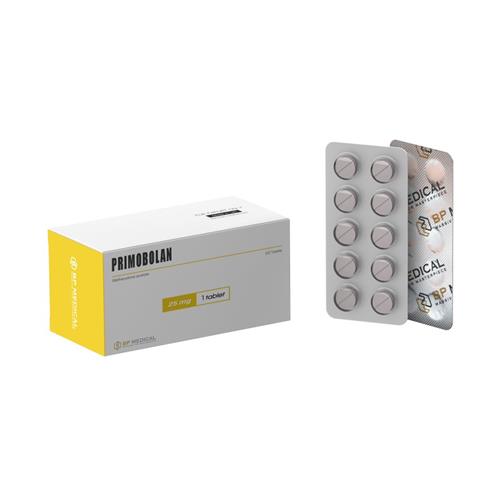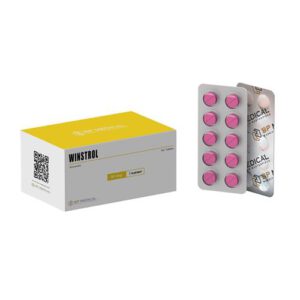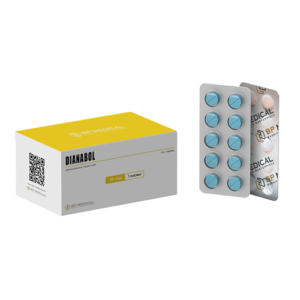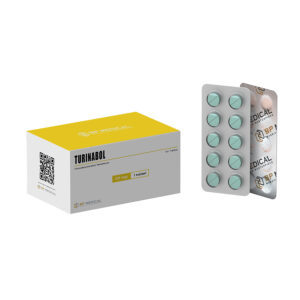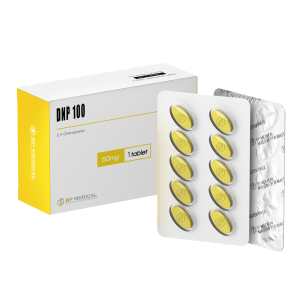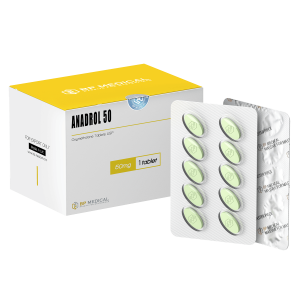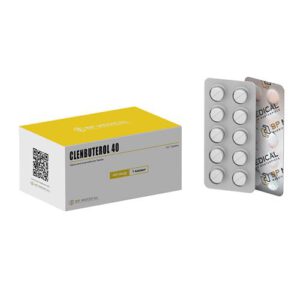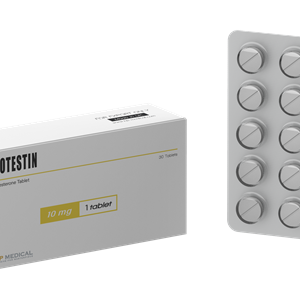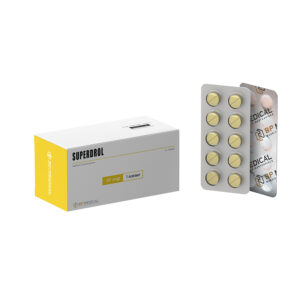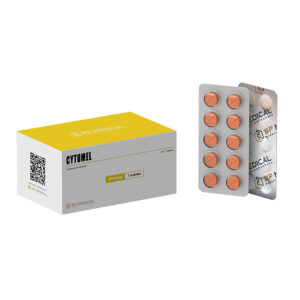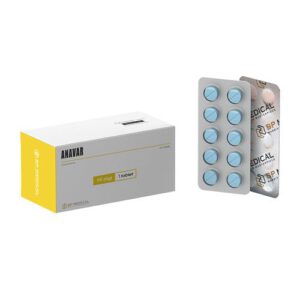- Low aromatization.
- Very safe to use.
- Great during cutting diet to prevent muscle mass.
- Perfect for bridging between steroid cycles.
- No liver toxicity.
Description:
Primobolan® is a brand name for the anabolic steroid methenolone acetate. This agent is very similar in action to Primobolan® Depot (methenolone enanthate), except here the drug is designed for oral administration instead of injection. Methenolone acetate is a non-c17-alpha-alkylated oral steroid, one of only a few commercially available oral agents that presents limited liver toxicity to the user. It is also highly favored for its properties as a moderately effective anabolic with low androgenic and no estrogenic properties. It is, likewise, commonly used during cutting phases of training, when lean tissue growth and solid muscularity, not raw bulk, are the key objectives.
History:
Methenolone was first described in 1960.577 Squibb would introduce the drug (as methenolone acetate) to the UnitedStates in 1962.578 This agent was sold for a very short time as a 20 mg tablet, under the brand name of Nibal®. Schering in West Germany (now Bayer) would be granted rights to the drug that same year, and would sell it under the Primobolan® name. Nibal® was soon removed from the U.S. market, never to return as a commercial product. Schering now had exclusive patent rights to produce methenolone acetate, and would continue to sell the drug uninterrupted since 1962, and consumers had naturally come to identify methenolone acetate as a product of Schering.
Primobolan® has always been identified as a European steroid, and during the 1960’s and ’70’s was being offered
for sale in such countries as Germany, Austria, Belgium,France, the Netherlands, and Finland. At one time Schering also manufactured a 20 mg/ml oil-based injectable of methenolone acetate in limited markets (called Primobolan®Acetate), but it has been out of manufacture since 1993. Injectable methenolone acetate proved to be very popular for pre-contest cutting use, and was gravely missed among European competitors when discontinued. Although we still have the acetate in oral form, it is a close, but not equal, substitute (injection is a much more efficient form of delivery for this steroid).
Primobolan® is prescribed as a lean tissue building anabolic agent, often used in cases where body wasting has occurred secondary to major surgery, infection, wasting disease, aggressive corticosteroid administration, or malnutrition. (Some clinicians also prescribe this agent for treating osteoporosis and sarcopenia, or the natural loss of muscle mass with aging). This steroid has also been used to promote weight gain in underweight premature infants and children in clinical studies, and was able to do so effectively and without signs of toxicity or undesirable effects.579 Athletes have long favored the combined strong anabolic, weakandrogenic, and non-estrogenic nature of this drug, which makes it very desirable for building lean muscularity without side effects.
Although Primobolan® demonstrated a good record of clinical safety, Schering had withdrawn this drug from most
markets by the early 2000s. No 50 mg versions are still in manufacture, and at most a select couple of products
containing 5 mg or 25 mg may still be in circulation. The only confirmed sources for oral brand name Primobolan in recent years were in Japan and South Africa, and these were sold under the Schering name. It is unknown if any such products have been brought over to the new Bayer label. Aside from this, a very small number of pharmaceutical preparations containing methenolone acetate may still be in production.
How Supplied:
All forms of Schering Primobolan® contain 5 mg, 25 mg, or 50 mg (no longer available) of methenolone acetate per tablet. Composition and dosage of other brands may vary by country and manufacturer.
Structural Characteristics:
Methenolone is a derivative of dihydrotestosterone. It contains one additional double bond between carbons 1 and
2, which helps to stabilize the 3-keto group and increase the steroid’s anabolic properties, and an additional 1-methyl group, which protects the steroid against hepatic metabolism. Primobolan makes use of methenolone with a carboxylic acid ester (acetic acid) attached to the 17-beta hydroxyl group to further help protect it from oxidation during oral administration. Studies have demonstrated the methenolone is an effective oral anabolic agent in both the acetate and unesterified forms.580 581
Side Effects (Estrogenic):
Methenolone is not aromatized by the body,582 and is not measurably estrogenic. Estrogen-linked side effects should not be seen when administering this steroid. Sensitive individuals need not worry about developing gynecomastia, nor should they be noticing any appreciable water retention with this drug. The increase seen with methenolone should be quality muscle mass, not the smooth bulk that often accompanies steroids open to aromatization. During a cycle, the user should additionally not notice strong elevations in blood pressure, as this effect is also related (generally) to estrogen and water retention. Methenolone is a steroid most favored during cutting phases of training, when water and fat retention are major concerns, and sheer mass not the central objective.
Side Effects (Androgenic):
Although classified as an anabolic steroid, androgenic side effects are still possible with this substance. This may include bouts of oily skin, acne, and body/facial hair growth.
Anabolic/androgenic steroids may also aggravate male pattern hair loss. Women are warned of the potential virilizing effects of anabolic/androgenic steroids. These may include a deepening of the voice, menstrual irregularities, changes in skin texture, facial hair growth, and clitoral enlargement. Methenolone is still a very mild steroid, however, and strong androgenic side effects are typically related to higher doses. Women often find this preparation an acceptable choice, observing it to be a very comfortable and effective anabolic.
Side Effects (Hepatotoxicity):
Methenolone is not considered a hepatotoxic steroid; liver toxicity is unlikely. Studies have failed to produce appreciable changes in markers of hepatic stress when the drug was given in therapeutic levels.571
Side Effects (Cardiovascular):
Anabolic/androgenic steroids can have deleterious effects on serum cholesterol. This includes a tendency to reduce HDL (good) cholesterol values and increase LDL (bad) cholesterol values, which may shift the HDL to LDL balance in a direction that favors greater risk of arteriosclerosis. The relative impact of an anabolic/androgenic steroid on serum lipids is dependant on the dose, route of administration (oral vs. injectable), type of steroid (aromatizable or nonaromatizable), and level of resistance to hepatic metabolism. Methenolone should have a stronger negative effect on the hepatic management of cholesterol than testosterone or nandrolone due to its non-aromatizable nature, but a much weaker impact than c-17 alpha alkylated steroids. Anabolic/androgenic steroids may also adversely affect blood pressure and triglycerides, reduce endothelial relaxation, and support left ventricular hypertrophy, all potentially increasing the risk of cardiovascular disease and myocardial infarction.
To help reduce cardiovascular strain it is advised to maintain an active cardiovascular exercise program and minimize the intake of saturated fats, cholesterol, and simple carbohydrates at all times during active AAS administration. Supplementing with fish oils (4 grams per day) and a natural cholesterol/antioxidant formula such as Lipid Stabil or a product with comparable ingredients is also recommended.
Side Effects (Testosterone Suppression):
All anabolic/androgenic steroids when taken in doses sufficient to promote muscle gain are expected to suppress endogenous testosterone production. Without the intervention of testosterone-stimulating substances, testosterone levels should return to normal within 1-4 months of drug secession.
Note that prolonged hypogonadotrophic hypogonadism can develop secondary to steroid abuse, necessitating medical intervention. At a moderate dosage of 100-200 mg weekly, methenolone should offer measurably less testosterone suppression than an equal dose of nandrolone or testosterone, due to its non-aromatizable nature. If used for less than eight weeks, hormonal recovery should not be a protracted experience.
The above side effects are not inclusive. For more detailed discussion of potential side effects, see the Steroid Side Effects section of this book.
Administration (General):
Studies have shown that taking an oral anabolic steroid with food may decrease its bioavailability.586 This is caused by the fat-soluble nature of steroid hormones, which can allow some of the drug to dissolve with undigested dietary fat, reducing its absorption from the gastrointestinal tract. Formaximum utilization, this steroid should be taken on an empty stomach.
Administration (Men):
The prescribing guidelines for Primobolan® recommend a maximum daily dosage of 100-150 mg per day. The usual administration protocols for physique- or performance enhancing purposes call for 75-150 mg daily, which is taken for 6 to 8 weeks. This level is sufficient to impart a measurable anabolic effect, although one usually doesn’t expect to achieve great gains in muscle mass with this drug. Instead, Primobolan® is utilized when the athlete has a specific need for a mild anabolic agent, most notably in cutting phases of training.
Due to its mild nature, Primobolan® is often used in conjunction with other steroids for a stronger effect. In such
cases, a slightly lower dose is often used (50-100 mg perday). During a dieting or cutting phase, thought to be its
primary application, a non-aromatizing androgen like Halotestin® or trenbolone is often added. Such combinations would enhance the physique without water retention, and help bring out a harder and more defined look of muscularity. Non-aromatizing androgen/anabolic stacks like this are very popular among competing bodybuilders, and prove quite reliable for rapidly improving the contest form. This compound is also occasionally used with more potent androgens during bulking phases of training. The addition of testosterone, Dianabol or Anadrol 50® is common, although the gains are often accompanied by some level of smoothness due to the added estrogenic component, as well as hepatotoxicity in the case of the latter two agents.
Administration (Women):
The prescribing guidelines for Primobolan® do not offer separate dosing recommendations for women, although it is indicated that women who are pregnant, or may become pregnant, should not use the drug. Female athletes generally respond well to 50-75 mg daily, with no signs of virilization symptoms. One would not expect a tremendous amount of muscle mass with this drug, and instead find a slow and steady (quality) increase. Some women choose to further add-in other anabolics such as Winstrol® or oxandrolone, in an effort to increase the muscle-building effectiveness of a cycle. While both of these compounds are quite tolerable, one must be sure not to use too high an accumulated dosage. Taken at too high a dosage, these weak anabolics can quickly cause masculinizing side effects.
References by William Llewellyn’s, ANABOLICS, E-Book Edition.
฿1,800.00 Original price was: ฿1,800.00.฿1,620.00Current price is: ฿1,620.00.
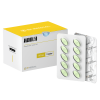
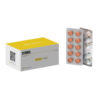
฿990.00

